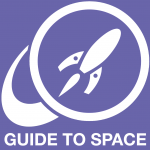Podcaster: Fraser Cain

Title: Guide To Space – How Do Ion Engines Work?
Organization: Universe Today
Link: www.universetoday.com
Description:
The Most Efficient Propulsion System Out There
From May 15, 2018.
People always ask me why we’re stuck with chemical rockets. Seriously, exploding a bunch of hydrogen or kerosene is the best we can do?
Good news, there are other, exotic science fiction-sounding propulsion systems out there which use electromagnetic fields to accelerate atoms, allowing their spacecraft to accelerate for months at a time.
I’m talking about ion engines, of course, and several spacecraft have already used these exotic thrusters to perform some of the most amazing missions in the exploration of the Solar System.
Bio: Fraser Cain is the publisher of Universe Today
Today’s sponsor: Big thanks to our Patreon supporters this month: Paul M. Sutter, Chris Nealen, Frank Frankovic, Frank Tippin, Jako Danar, Michael Freedman, Nik Whitehead, Rani Bush, Ron Diehl, Steven Emert, Brett Duane, Don Swartwout, Vladimir Bogdanov, Steven Kluth, Steve Nerlich, Phyllis Foster, Michael W, James K Wood, Katrina Ince, Cherry Wood.
Please consider sponsoring a day or two. Just click on the “Donate” button on the lower left side of this webpage, or contact us at signup@365daysofastronomy.org.
Or please visit our Patreon page: https://www.patreon.com/365DaysOfAstronomy
End of podcast:
365 Days of Astronomy
=====================
The 365 Days of Astronomy Podcast is produced by Planetary Science Institute. Audio post-production by Richard Drumm. Bandwidth donated by libsyn.com and wizzard media. You may reproduce and distribute this audio for non-commercial purposes.
This show is made possible thanks to the generous donations of people like you! Please consider supporting to our show on Patreon.com/365DaysofAstronomy and get access to bonus content.
After 10 years, the 365 Days of Astronomy podcast is entering its second decade of sharing important milestone in space exploration and astronomy discoveries. Join us and share your story. Until tomorrow! Goodbye!

